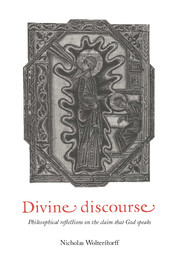Book contents
- Frontmatter
- Contents
- Preface
- 1 Locating our topic
- 2 Speaking is not revealing
- 3 The many modes of discourse
- 4 Divine discourse in the hands of theologians
- 5 What it is to speak
- 6 Could God have and acquire the rights and duties of a speaker?
- 7 Can God cause the events generative of discourse?
- 8 In defense of authorial-discourse interpretation: contra Ricoeur
- 9 In defense of authorial-discourse interpretation: contra Derrida
- 10 Performance interpretation
- 11 Interpreting the mediating human discourse: the first hermeneutic
- 12 Interpreting for the mediated divine discourse: the second hermeneutic
- 13 Has Scripture become a wax nose?
- 14 The illocutionary stance of biblical narrative
- 15 Are we entitled?
- 16 Historical and theological afterword
- Notes
- Index
15 - Are we entitled?
Published online by Cambridge University Press: 01 June 2011
- Frontmatter
- Contents
- Preface
- 1 Locating our topic
- 2 Speaking is not revealing
- 3 The many modes of discourse
- 4 Divine discourse in the hands of theologians
- 5 What it is to speak
- 6 Could God have and acquire the rights and duties of a speaker?
- 7 Can God cause the events generative of discourse?
- 8 In defense of authorial-discourse interpretation: contra Ricoeur
- 9 In defense of authorial-discourse interpretation: contra Derrida
- 10 Performance interpretation
- 11 Interpreting the mediating human discourse: the first hermeneutic
- 12 Interpreting for the mediated divine discourse: the second hermeneutic
- 13 Has Scripture become a wax nose?
- 14 The illocutionary stance of biblical narrative
- 15 Are we entitled?
- 16 Historical and theological afterword
- Notes
- Index
Summary
The turn of the kaleidoscope confronts us at last with questions of epistemology. After distinguishing various modes of speaking, and offering an account of its nature, I went on to argue that, from a theistic perspective, God could speak; there is nothing impossible in that. From those issues of discourse theory and of philosophical theology, we moved on to issues of interpretation. Here I singled out for near-exclusive attention that long-enduring, though now intensely controverted, practice within the Christian community of reading the Bible so as to discern what God said by way of authoring it. I defended the legitimacy in general of authorial-discourse interpretation; and I considered how one ought to go about interpreting scripture if it is the single divine voice that one is looking for. Now at last we are face to face with the question: does God speak?
Our situation is not that we and a few others have recently begun to entertain the proposition that God speaks, and are now wondering whether to accept or reject that proposition. Countless human beings, down through the ages, and on into our own time and place, have in fact believed that God speaks. Let us, then, pose our question in full recognition of that fact; let us ask how such beliefs are to be appraised.
- Type
- Chapter
- Information
- Divine DiscoursePhilosophical Reflections on the Claim that God Speaks, pp. 261 - 280Publisher: Cambridge University PressPrint publication year: 1995



